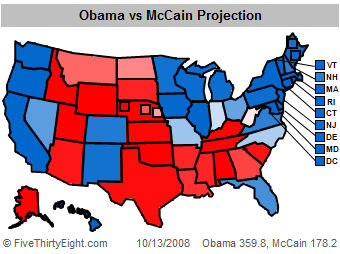 While each candidate in Wednesday night’s debate gave his stump speech on Roe v. Wade, only Obama mentioned the need for better sex education in the school system, and that was quickly skedaddled by a change in topic. Put another way, as politicians are such fans of doing, the two candidates spent more time discussing whether Obama did or did not launch his campaign in Bill Ayers’ living room than discussing how they plan to battle rising teen pregnancy and STD rates. As Amy Schalet pointed out in a Washington Post article last week, “High teen pregnancy rates result in part from our inability to talk honestly and wisely about teen sexuality.” So where are we left if our two presidential candidates are never asked to talk about it at all?
While each candidate in Wednesday night’s debate gave his stump speech on Roe v. Wade, only Obama mentioned the need for better sex education in the school system, and that was quickly skedaddled by a change in topic. Put another way, as politicians are such fans of doing, the two candidates spent more time discussing whether Obama did or did not launch his campaign in Bill Ayers’ living room than discussing how they plan to battle rising teen pregnancy and STD rates. As Amy Schalet pointed out in a Washington Post article last week, “High teen pregnancy rates result in part from our inability to talk honestly and wisely about teen sexuality.” So where are we left if our two presidential candidates are never asked to talk about it at all?
Of course, part of the problem is that very few people besides the Religious Right, NARAL Pro-Choicers, and well, those who read this blog, are asking these questions. Sure, there are other things on our mind: the economy, Iraq, etc. But our general populace’s inability to ask basic, rational questions about the way their children are taught about sex in schools, and therefore their ceding of these decisions to a minority base, speaks to larger problems in our culture: an inability to approach sex in an individualized and normalized way.
Dagmar Herzog talks in Sex in Crisis about the anxiety with which America adults in the twenty-first century approach sex. In the nineties, most Americans seemed relatively satisfied with their sex lives. Sure it wasn’t always the best sex ever; sometimes there was boredom, or lack or desire, or lack of orgasm, or any of the other minor dissatisfactions that are normal in a human sexuality that can only be as perfect as the person experiencing it. Sometimes there were fears about love and emotional connection. But of course, again, why wouldn’t there be? Now, with articles and drug campaigns asking you whether you are experiencing a tepid orgasm, erectile dysfunction, porn addiction, you name it, American adults are constantly told to compare their sexuality to others and ask themselves, “Is there something wrong with my sex life?†As Herzog writes:
What is going on is an ideological assault on something pretty fundamental: the most intimate and personal aspects of sex. It worms its way into the core of the psyche by playing on the imperfections and emotional confusion that so often accompany sex. Rather than helping people get comfortable with the unruliness of desire, the current trendy idea is to freak people out.
Now, if adults are experiencing this level of anxiety about their own sexual lives, imagine how such over-scrutiny and neuroticism is translated to a population who has long been subject to excessive sexual observation in America. If sex can is psychologically and emotionally damaging for adults, given the especial “unruliness” of the teenage sex drive and a whole life during which this psychological damage can manifest itself, it must be doubly so for teens.
But what if we began to treat not only adult sexuality, but teenage sexuality, as normal? In a qualitative study comparing conceptions of teenage sexuality in the Netherlands and the United States, Amy Schalet documents how American adults dramatize teenage sexuality as hormone-raging, out-of-control, and irrational. (Part of the study is published as “Must We Fear Adolescent Sexuality? at Medscape General Medicine.) Dutch parents, on the other hand, recognize teenage relationships as legitimate and work to normalize sexuality.
Guess which country has the lower teenager pregnancy and STD rates.

 Three Things:
Three Things: And a quick PSA from me:
And a quick PSA from me:  Tonight is the
Tonight is the  Now, I am not one to trust the polls or to stop from knocking on wood every time a little flicker of hope rises in that maybe, just maybe, we’ll see President Obama in office come January. But in the spirit of things that may brighten up the day a bit, take a look at this analysis from the super-analyzers over at the FiveThirtyEight blog, which does some intense number-crunching and analyses of these way-too-many-too-confusing (ok, at least for me, who in studying for the GRE last night made some pretty red-faced math mistakes) poll numbers. According to their analysis, John McCain only has a 5.9% chance of winning the electoral college. Now this may seem overly optimistic even to the most glass-full of us, but take a look at their reasoning.
Now, I am not one to trust the polls or to stop from knocking on wood every time a little flicker of hope rises in that maybe, just maybe, we’ll see President Obama in office come January. But in the spirit of things that may brighten up the day a bit, take a look at this analysis from the super-analyzers over at the FiveThirtyEight blog, which does some intense number-crunching and analyses of these way-too-many-too-confusing (ok, at least for me, who in studying for the GRE last night made some pretty red-faced math mistakes) poll numbers. According to their analysis, John McCain only has a 5.9% chance of winning the electoral college. Now this may seem overly optimistic even to the most glass-full of us, but take a look at their reasoning.  To cap off your day, here’s Framingham State College’s Virginia Rutter with a great post on what exactly Sarah Palin doesn’t seem to get about “feminism” and “sexism” and how this allows her to erroneously invoke identity politics in her favor.–Kristen
To cap off your day, here’s Framingham State College’s Virginia Rutter with a great post on what exactly Sarah Palin doesn’t seem to get about “feminism” and “sexism” and how this allows her to erroneously invoke identity politics in her favor.–Kristen Here are some quick hits of issues on the Sex and Sensibility front that caught my eye this week:
Here are some quick hits of issues on the Sex and Sensibility front that caught my eye this week: At a rally on Saturday in California, Sarah Palin offered up what
At a rally on Saturday in California, Sarah Palin offered up what 